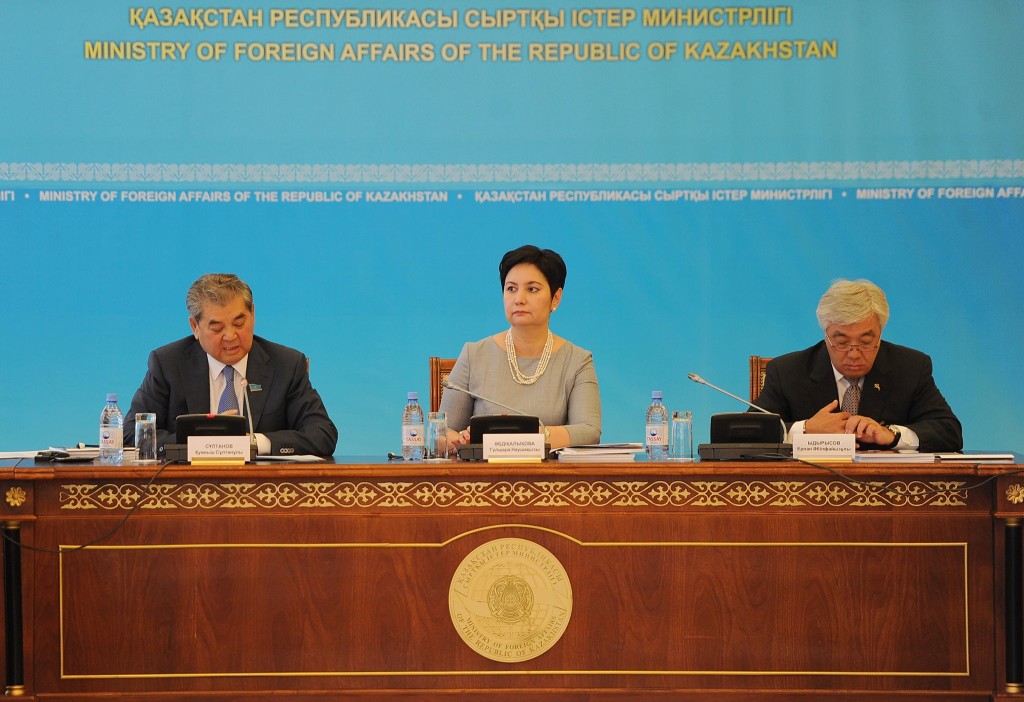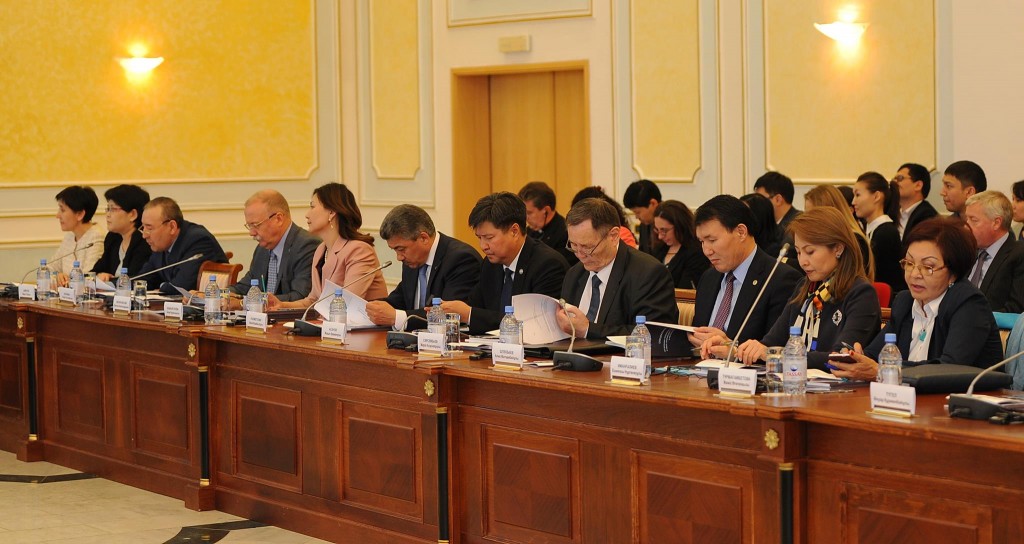ASTANA – Kazakhstan, a country that is a source, a destination and a transit country trafficking in persons has done a lot to combat this problem, yet it should do much more to more effectively overcome it. This was the gist of a special report of the Human Rights Commission under Kazakh President Nursultan Nazarbayev that was presented May 19 at the Ministry of Foreign Affairs of Kazakhstan.
 Published in Kazakh, Russian and English with the technical assistance of the International Organisation for Migration (IOM) in Kazakhstan, the report received positive review from the head of state as well as national and international experts.
Published in Kazakh, Russian and English with the technical assistance of the International Organisation for Migration (IOM) in Kazakhstan, the report received positive review from the head of state as well as national and international experts.
Welcoming remarks were given by KazakhSecretary of State Gulshara Abdykalikova, Foreign Minister Erlan Idrissov, Human Rights Commission chair Kuanysh Sultanov, Deputy Minister of Internal Affairs Marat Demeuov, Minister of Healthcare and Social Development Tamara Dyussenova, IOM Central Asia coordinator Dejan Keserovich, deputy head of the European Union (EU) delegation in Kazakhstan Kamen Velichkov and Ambassadors to Kazakhstan Carolyn Browne (United Kingdom), George Krol (United States) and Ole Johan Bjornoy (Norway).
In her speech, Abdykalikova noted the uniqueness of the commission’s report and drew attention to the recommendations aimed at improving the interaction mechanisms of law enforcement bodies with NGOs in the fight against human trafficking, as well as the provision of social services to trafficking victims.
 “The report of the commission contains full analyses of the situation with regard to human rights protection in the area of combating trafficking in persons and it is a very important document for all the state agencies’ and NGOs’ activities. Today’s topic is very relevant and important from the internal point of view, as well as international cooperation, because all of us know that human trafficking is a modern type of slavery,” said Idrissov.
“The report of the commission contains full analyses of the situation with regard to human rights protection in the area of combating trafficking in persons and it is a very important document for all the state agencies’ and NGOs’ activities. Today’s topic is very relevant and important from the internal point of view, as well as international cooperation, because all of us know that human trafficking is a modern type of slavery,” said Idrissov.
“Human trafficking is occupying the third place after drugs and weapons trafficking. In order to eliminate this evil, we need to hold active and fruitful international cooperation,” he added.
Browne started her speech by addressing participants in the Kazakh language and thanked the commission for the invitation.
“The United Kingdom is one of the largest financial contributors to all activity by the European Union. … We warmly welcome the fact that the Kazakhstan government continues working with us. I hope that the finding presented in the report today will help Kazakhstan to combat human trafficking,” she said.
During the presentation, reports were made by members and experts of the commission, including Tastemir Abishev, Vitaly Voronov, Nurila Shakhanova, Raissa Yurchenko and Zulfiya Baisakova.
The report provides comparative analysis of national legislation and law enforcement practice in the field of protection of rights of human trafficking victims in accordance with international treaties ratified by Kazakhstan, evaluation of activities of the state bodies and concrete steps to further improve the mechanisms for the protection of socio-economic, labour and cultural rights of vulnerable groups in accordance with the Constitution and international standards.
Experts praised the provisions of the special report and marked the beginning of practical implementation of the recommendations by the Kazakh government and parliament.
The report noted that in recent years, Kazakhstan has made significant progress in combating trafficking in persons (TIP), the development acknowledged by the Organisation for Security and Cooperation in Europe (OSCE) office of the special representative and coordinator for combating trafficking in human beings, which was based on the findings of two visits to Kazakhstan in 2013 and 2014.
According to the document, the introduction of amendments and additions to national legislation on countering TIP and domestic violence was particularly beneficial, enabling much more severe sentencing for related offences and increasing the preventive impact of corresponding laws.
According to the report, it must be acknowledged, however, that the current Kazakh legislation is mainly aimed at combating TIP and, to a lesser extent, social protection of victims of human trafficking and the protection of their interests. This often leads to their re-victimisation and further social dis-adaptation and depravation.
It is the view of the Human Rights Commission that it is necessary to place the protection of the rights of victims of human trafficking in the forefront of activities of public authorities, make fuller use of civil society institutions in protecting the rights of victims of abuse and pay special attention to increasing public legal awareness, including among victims of human trafficking.
The report says national mechanisms for the protection of rights of victims of human trafficking and ensuring that they have access to special social services need significant adjustment, ensuring that the specific needs of more vulnerable groups, such as migrant workers and children, are also addressed.
The commission believes that the implementation of its special recommendations should be aimed at achieving the following outcomes:
- Prevention of irregular migration and TIP;
- Integration of international human rights standards into national legislation and law enforcement practices in the area of the protection of rights of victims of human trafficking;
- Improvement of national mechanisms protecting the rights of victims of abuse, including victims of human trafficking;
- Effective protection of civil, social, labour and cultural rights of victims of abuse;
- Implementation of special programmes aimed at fulfilling the rights of victims of human trafficking;
- Creation of a national mechanism for referral of victims of human trafficking among law enforcement agencies, NGOs, healthcare establishments and social services;
- Provision on a range of special social services to victims of abuse, including victims of human trafficking and domestic violence;
- Successful reintegration and re-socialisation of victims of abuse, including victims of human trafficking and domestic violence, in appropriate crisis rehabilitation centres;
- Transparency of the activities of relevant government agencies and NGOs dealing with victims of abuse, including victims of human trafficking and domestic violence;
- High awareness levels among the public, including victims of human trafficking, in respect of universally-recognised human rights standards and their significance for every person and society as whole(awareness-raising in the area of human rights);
- Improved legal awareness among law enforcement officers and the public;
- Decreased risks of social tension and social stigma of certain groups and potential social conflict with stronger national security.
“By fulfilling the recommendations of the special report, Kazakhstan will be able to achieve new goals in building a state which is governed by the rule of law and in strengthening government and civil mechanisms for the protection of rights of victims of abuse, including victims of human trafficking and domestic violence at the international standards level,” the commission said.
The gathering at the foreign ministry was attended by heads of central state bodies, representatives of the legislative, executive and judicial branches of government, law enforcement agencies of Kazakhstan, legal scholars, lawyers, notaries and heads of international organisations and diplomatic missions accredited in Kazakhstan, as well as representatives of educational institutions, science, culture, healthcare, business and the media.

